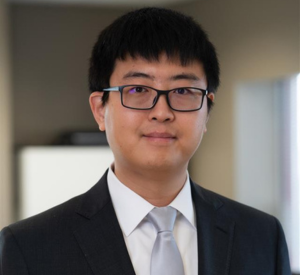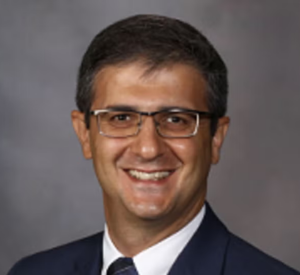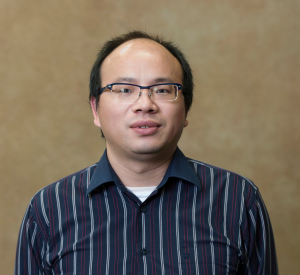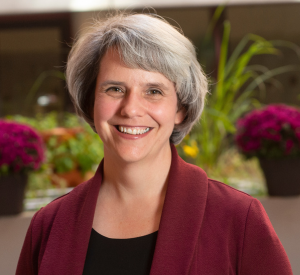Yanshan Wang, Department of Health Information Management vice chair for research and assistant professor, is leading an interprofessional team of researchers in the School of Health and Rehabilitation Sciences (SHRS) on an NIH award that will examine using artificial intelligence to enhance rehabilitation therapy care for stroke survivors.
The four-year R01 grant, titled “ARISE-CARE: Advancing Rehabilitation for Stroke Patients with AI to Elevate Therapy Care,” is funded by the NIH National Library of Medicine, with a total award amount of $1,752,187.
The research addresses the pressing need to improve the quality of rehabilitation interventions to better help the patients’ health and wellbeing, and to evaluate the effectiveness of generative AI in clinical documentation.
The SHRS research team includes Health Informatics faculty members Associate Professor Leming Zhou and Assistant Professor Ahmad P. Tafti (Department of Health Information Management), and rehabilitation researchers and practitioners Professor Elizabeth Skidmore and Research Scientist Minmei Shih (Department of Occupational Therapy).
Learn more about Wang’s research and its importance to clinicians and stroke survivors, in his own words.
What is the ultimate goal of your research?
The goal of our research is to make stroke rehabilitation therapy more effective by using artificial intelligence (AI). The approach is two-fold:
First, right now, therapists write notes by hand to track how patients are doing, but this takes a lot of time and doesn’t always capture every important detail. Ambient AI software, such as Abridge and DAX Copilot, and generative AI models, such as GPT-4 and LLaMA, have become available to take therapist patient conversations as input and automatically create clinical notes. However, the quality of the generated notes is understudied.
We want to assess the automated-created clinical notes generated by these software and AI models, and enhance these models to generate high-quality notes. This will give therapists more time to focus on patients and ensure the care they provide is consistently documented and improved.
Second, implementation science is crucial because even the best AI tool will fail if it cannot be smoothly integrated into the day-to-day work of therapists and rehabilitation clinics. In our project, we are not only testing whether AI can generate useful notes, but also studying how therapists, patients and health systems respond to these tools. By understanding barriers—such as trust, workflow disruptions or training needs—we can design strategies that make adoption easier and more sustainable. This ensures that our AI models are not just promising in theory but are actually implemented, and usable, effective and beneficial in real-world rehabilitation settings.
Why is this research so important to the public?
This project matters because stroke is one of the leading causes of long-term disability, and many patients struggle to get the most out of their rehabilitation in the U.S. For example, if someone in Pennsylvania has a stroke and is working to walk again, AI can help their therapist capture small signs of progress that might otherwise be missed and ensure their care plan is tailored more precisely.
This project will make sure the right AI is used here and that the implementation of AI in clinical practice is successful and effective. Over time, this means better recovery, fewer hospital visits and a faster return to everyday life. By making therapy more effective and efficient, our work could directly improve the quality of care for thousands of people in Pennsylvania and across the U.S.

How will students be involved in the research?
We have Rehabilitation Science PhD student-researchers who are concentrating in health informatics and will play an important role in analyzing data, testing AI models and working with clinicians to understand AI applications in rehabilitation setting to advance therapy care. By assisting on the project, they will learn cutting-edge skills in AI and implementation science while also seeing how AI technology can directly improve patient care. This experience will prepare them for careers in health care AI, giving them valuable training that bridges AI and health care.
What makes doing this research at Pitt so unique?
We have a unique dataset of rehabilitation video recordings from Dr. Skidmore’s previous studies which makes this research possible to study how AI could be used to enhance rehabilitation therapy care and how AI can be best implemented in the rehabilitation setting.
In addition, Pitt has great environment to support research. This project was originally funded by the University of Pittsburgh Clinical and Translational Science Institute (CTSI) Exploring Existing Data Resources Rapid Pilot Award, which makes it possible for us to collect preliminary data and results and finally prepare the R01 grant applications. Without this preliminary support from Pitt CTSI, this project will not be possible.
What excites you the most about this project?
What excites me most is the opportunity to implement AI in real world clinical practice and to bring AI directly into the hands of therapists. This will make their work better and easier, and ultimately make patients’ recovery better.
On a personal level, I am inspired by how stroke survivors fight every day to regain their independence. If our work can make therapy sessions more effective and ensure that progress is tracked more carefully, then we are helping patients and their families in very real ways. That possibility motivates me every day.





